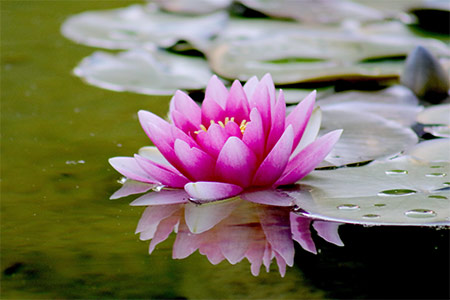 When you hear the word “zen,” what comes to mind? Peace? Quiet? Solitude? Tranquility? Beauty? Meditation? Joy? Zen can include all of these things, and so can a Zen garden.
When you hear the word “zen,” what comes to mind? Peace? Quiet? Solitude? Tranquility? Beauty? Meditation? Joy? Zen can include all of these things, and so can a Zen garden.
Zen gardens have become popular backyard features in the past several years. Some people hire a landscaping company to install one for them, but you can create your own with a surprisingly small time, labor and financial investment depending on how large you want it to be. And its size, as well as everything in it, is completely up to you. After all, its purpose is to be your own private place where you can contemplate when and how you want to.
Traditional Zen Gardens
A true Zen garden is a “karesansui;” i.e., a dry landscape that contains only rocks and gravel with no water and no plantings. You arrange the larger rocks in strategic locations on a gravel bed so as to symbolize mountains and/or islands. Then you rake the surrounding gravel — and sand, if you prefer — into patterns that symbolize flowing water and dry land paths. The sand or gravel serves a functional purpose as well. It helps prevent or at least slow the growth of weeds.
If you choose gravel as your only bed, your Zen garden likely will require very little maintenance other than the occasional weed pulling. Sand, however, likely will require daily raking to preserve the patterns you create. Many Zen gardeners say, however, that this daily raking becomes a meditation practice in and of itself.
Of course, you’ll need a place to sit in your Zen garden while contemplating. Wood should be your material of choice in constructing benches or chairs since wood is a natural organic substance. If you enjoy strolling while thinking, you also may wish to consider building a small wooden bridge over one or two portions of your “flowing water.” If you envision meditating in your Zen garden after the sun goes down, you may also wish to add wooden lanterns, possibly containing citronella candles so as to keep the bugs away. Another idea would be to stick a series of unobtrusive low-rising and fairly dim garden lights in the ground that will outline your various garden paths.
Since you’ll want your Zen garden to be as quiet and peaceful place as possible, you may want to plant fast-growing shrubs around its perimeter. Or, if your garden is a larger one, you could install a privacy fence around it. The whole purpose of enclosing your garden is to make it not only your own private get-away, but also as free of traffic and neighborhood noise as possible.
History of Zen
Zen is a form of Buddhism that originated in India. The Indian monk Bodhidharma introduced it into China during the 6th Century. It immediately flourished there and enjoyed its golden age starting with the reign of the Sixth Patriarch, Hui-neng (638–713) and ending when Zen Buddhists suffered extreme persecution in China in the middle of the 9th Century. Some Zen masters survived the great persecution, but although Zen Buddhism saw a revival in China, it was never the same as before.
By the 7th Century, Zen Buddhism had spread to Korea and thence to Japan during the 12th Century. Not until the late 19th Century did it become popular in the West, thanks mainly to the Japanese scholar Daisetz Teitaro Suzuki (1870–1966). When people talk about a Zen garden, they’re talking about Japanese gardens rather than Chinese.
Major US Zen Gardens
While most US cities today feature one or more Zen gardens open to the public, if you want to visit a really spectacular one, try one of the following:
Keep in mind that most of these gardens are not true Japanese Zen gardens composed only of rocks, pebbles, sand, and wood. Instead, they feature such things as koi ponds or other water elements, flowering trees and shrubs, etc. Nevertheless, they can give you many ideas as to what to include in your own private Zen garden.
Add Your Comment